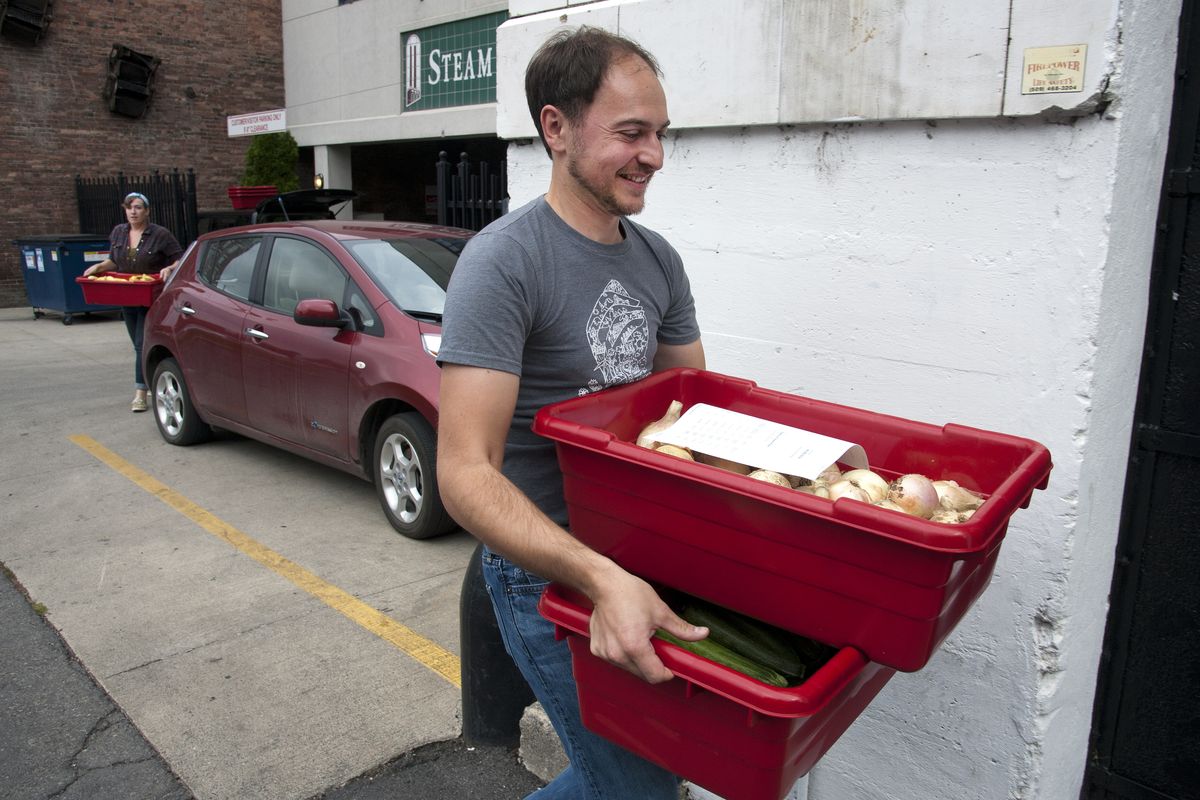E-cooperative connects farmers, buyers
Website offers customers selection, great prices

For Beth Robinette and Joel Williamson, it’s a good time to try to help small farmers sell more of their food to Spokane restaurants, colleges and hospitals.
Robinette, 26, and Williamson, 32, are the founders of LINC Foods – Local Inland Northwest Cooperative – a business experiment they hope will streamline how food services find and buy more local farm products.
Their timing seems to be solid; the farm-to-table movement has spread beyond small restaurants to a larger swath of the food economy.
Sodexo, the multinational corporation that manages food services at Gonzaga University and Whitworth University, adopted the slogan “the Real Food Challenge” in an effort to offer healthier menus to its customers. Its managers say they intend to use locally grown food to provide at least 20 percent of the food served on the GU campus by 2020.
Sodexo’s interest, along with other factors, spurred Williamson and Robinette to launch LINC Foods. They say the goal is to give small farmers, particularly those with 10 acres or less, more ways to sell products to local customers.
If it succeeds, growers will increase production, boosting the local farm economy, Robinette said.
Having a one-stop co-op can help institutions like Gonzaga and other schools buy locally grown food more efficiently than if they tried to arrange purchases from a handful of small growers, Robinette said.
“Those institutions spend a tremendous amount of money for food,” she added, “but right now they spend a minuscule amount – less than 2 percent – for food from local farmers.”
Chuck Faulkinberry, resident district manager for Sodexo at GU, said the company plans to order as much as it can get through LINC this fall. He knows LINC can only provide a portion of the food it needs, but Faulkinberry believes it’s important to add fresh food as much as possible to its menus.
So far about 10 restaurants have begun using the LINC website — www.lincfoods — to order from 13 local growers.
Barry Matthews, executive chef at Stacks at Steam Plant in downtown Spokane, said the website is a great way to place orders. He can search for what’s available, then decide how much to order. The site also identifies the farm he’s buying from.
Prices are more than competitive, he noted. He recently ordered pattypan squash through LINC for 75 cents per pound. Normally he’d pay about $2 a pound through commercial distributors, Matthews said.
“This is a better way for me to source food. I’d rather get it from local farms than from some distant corporate provider,” he said.
In the LINC system, farmers set their own price and keep 75 percent of the sale, Williamson said. The rest goes to the co-op. LINC’s farmers pay a $100 membership fee that mostly covers product liability insurance for the group. Part of the fee also helps pay a salary to the two organizers.
At year’s end, the collective profits – minus operating expenses – are divided among the farmers, based on proportion of total sales, and among workers based on hours they worked.
Both founders have family ties to local agriculture. Robinette has worked on her family’s business, the Lazy R Ranch on the West Plains, for years. Williamson’s grandparents raised produce and cut flowers on the Moran Prairie until 1998.
The two met while attending Bainbridge Graduate Institute in Seattle, where both studied sustainable businesses. They decided to join forces and work on a co-op model – using inspiration from sustainable agriculture researcher Ken Meter, who visited Spokane last fall.
“Right now we’re in the pilot part of the project to learn how this all works,” Robinette said. “We want to help farmers do better crop-planning as they learn what their customers want.”
One of the founding farmers is Dan Jackson, who runs a small farm in Spokane Valley. Like many others, Jackson farms as a sideline; his regular job is as a photographer for KREM-TV.
Up to now he’s mostly sold his vegetables on a one-to-one basis with restaurants. “The marketing of what I grow is harder than growing,” he said.
When marketing efforts sometimes fail, Jackson, like other farmers here, finds himself at the end of the season with extra produce he can’t sell.
The LINC system will be one way to help farmers get enough sales to sell what they grow and build the local market, he said.
The focus generally has been on helping sell local produce, but the website also helps buyers order processed beef. But because of regulations, LINC is not processing beef. Instead, it helps ranchers sell sections of beef after the meat has gone to a USDA-approved area processor.
“Our own meat processing is a long way off,” Robinette said. She added that LINC will also soon begin offering processed chicken, which goes through a regulatory system different than processed beef.